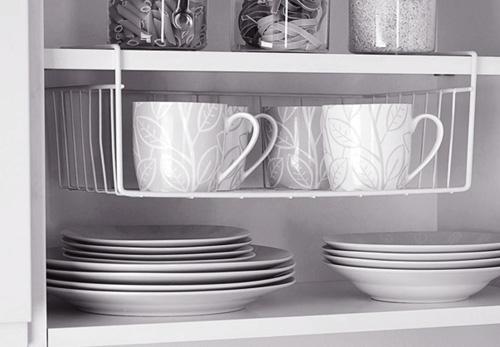杯释人生
2018-05-22ByKerrieR.Barney
By Kerrie R.Barney

The day my kitchen cabinet tried to kill me began like any other day. I had just padded downstairs in my robe to start a pot of coffee when I heard an ominous creak.2 Then an angry roar. Then, as some previously untapped instinct kicked in and I backed across the kitchen—I was still semi-asleep—the cabinet door right above my coffeemaker opened, and my entire collection of mugs spilled out.3 Some dropped into the sink; the rest poured forth in an impressive flood onto my tiled floor4. They landed with a crash of glass and pottery, inches from my slipper-clad feet.5
It is always disturbing when ones cabinetry turns violent. Fortunately, the explanation was simple: The plastic pegs6 holding up the adjustable shelves had suddenly failed, causing the shelves to fall. When I went to buy replacements, the hardware store guy said hed heard my story before.7 Apparently, some plastic pegs weaken over time and need to be replaced every decade or so, lest they suddenly decide theyre fed up and retire in a spectacular fashion.8 I purchased heavy-duty9 metal replacements for every plastic shelf peg in the house.
That evening, as I installed the new pegs, I reflected that Id learned a valuable lesson fairly cheaply.10 No one had been hurt, and I hadnt really lost much—all my plates and cooking equipment had been in other cabinets.
But every coffee mug I owned, except for one small teacup that had been in my dishwasher, was lost. What was I to do?
I neednt have worried. Coffee mugs, it turns out, are something of which everyone has extras. They are the opposite of socks. Instead of mysteriously disappearing, they tend to mysteriously appear, collecting in kitchens like so many ceramic dust bunnies.11 Regretted impulse purchases, sole survivors of long-broken dish sets, old gag gifts that had gagged far more than theyd gifted: My friends had them all.12 So did their friends, and their friendsfriends. And every one of them was more than willing to share their extra mugs with me.
In no time, my newly repaired cupboard ranneth over, filled with mugs of every size and shape. I was certainly grateful for the donated mugs, but some of them were radically13 different from what I would have chosen for myself. So here was the strange and unexpected thing: I fell in love with them. All of them.
The mug is such an attractive canvas14 for expression. If you can think it, it can probably be put on a mug—and most likely already has been. Our noblest dreams (“Visualize World Peace”) and our snarkiest sentiments (“Id love to stay and chat, but Im lying”)—theyre all right there, with full-color art or in block-print letters.15 My once boring cupboard was transformed into a rainbow of human experience. I quickly came to enjoy dipping into that spectrum every morning.16
I also discovered that there is something uniquely satisfying about drinking from a secondhand mug. The dishwasher-faded graphics and spoon-scratched interiors are comforting,17 like a well-worn T-shirt: something one can relax into and simply be with, an old friend. And since much of my collection came from people I dont know, the cups contain kernels of mystery: Who had visited Colfax, Wash., home of “The Worlds Largest Chainsaw Sculpture”?18 Whose donation had earned them a thankyou mug from the State Historical Society of Missouri19? And who had needed the comfort of a mug featuring two bedraggled20 kittens in the rain with the words, “I promise, someday well both look back on this and laugh”? Could he or she have known that one day, that very mug would comfort me?
I dont know. But I do know this: If you ever come by my house for coffee, you wont find it served in a neat new cup with a matching saucer21. Instead, youll get a unique example of human creativity that has been very much loved in the past—and will be for years to come.

1. My cupboard runneth over:“My cup
runneth over”引述自《希伯来圣经》(Hebrew Bible),意为“拥有的比需要的多”。这里作者仿拟这一表达,起到了一语双关的效果。runneth: 早期现代英语中run的第三人称单数形式。
2. pad:(放轻脚步)走,步行;robe: 睡袍,浴衣;ominous:(使人感到)不祥的,不妙的;creak: 嘎吱嘎吱声。
3. untapped: 茅塞未开的,未使用的;kick in:开始起作用;coffeemaker: 咖啡机;spill out:(突然)涌出。
4. tiled floor: 瓷砖地板。
5. 伴着一阵玻璃和陶器的哗啦声,它们坠落到地上,离我穿着拖鞋的脚只有几英寸远。slipper-clad: 穿着拖鞋的。
6. peg: 螺钉,接栓。
7. replacement: 替代(物);hardware store:五金店。
8. 显然,有的塑料钉日久失修,每隔十来年就需更换,以免它们突然心生厌烦,随即用一种壮观的方式退休(指钉子脱落)。lest: 以免;be fed up (with):(对……)感到厌烦。
9. heavy-duty:(材料)耐用的,耐久的。
10. 那一晚,我在安装新螺栓时反思出:我通过很低的代价,吸取了宝贵的教训。
11. 它们不会无故消失,而是会神秘地出现,堆积在厨房里,宛如许多陶瓷变成的积尘。ceramic: 陶瓷的;dust bunny: [美](家具等底下不常打扫处积起来的)小尘团。
12. 这些杯子我的朋友都有:有令人后悔的冲动购物,有餐具套装里经长期损毁后仍幸存的孤品,还有比起礼物更像是恶作剧的搞怪礼品。impulse purchase: 一时冲动而买下的东西;gag: 笑话,笑料。
13. radically: 根本上,彻底地。
14. canvas: 画布。
15. snarky: 暴躁的,易怒的;sentiment:情绪,态度;block-print: 用印刷字体写的。
16. dip into: 把??伸入(某处)取出(某物);spectrum: 谱,光谱。
17. dishwasher-faded graphic: 被洗碗机洗褪色的图案;spoonscratched interior: 有勺子刮痕的内壁。
18. kernel:(陈述、观点的)核心,要点;Colfax: 科尔法克斯,美国华盛顿州惠特曼县的县治;chainsaw sculpture: 电锯雕刻艺术。
19. State Historical Society of Missouri:密苏里州国家历史学会,位于美国密苏里州哥伦比亚市,专门研究和保护密苏里州的文化遗产。
20. bedraggled: 全身泥污的,渾身湿透的。
21. matching saucer: 相配的茶碟。
